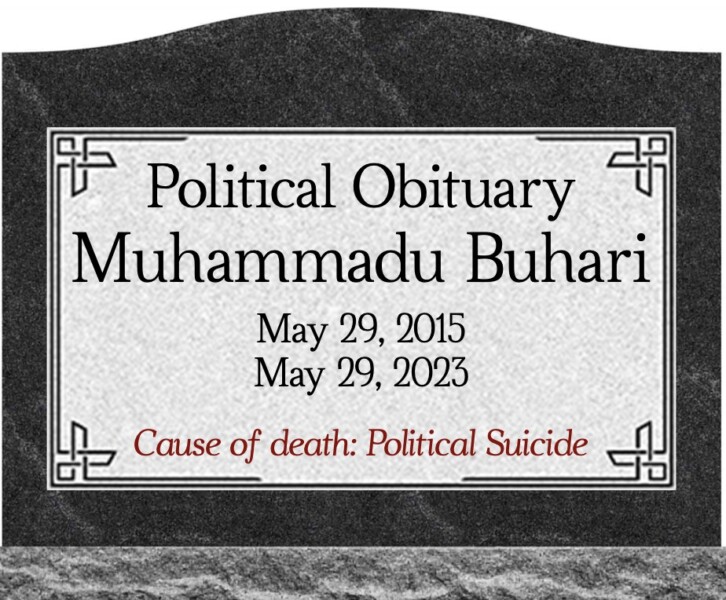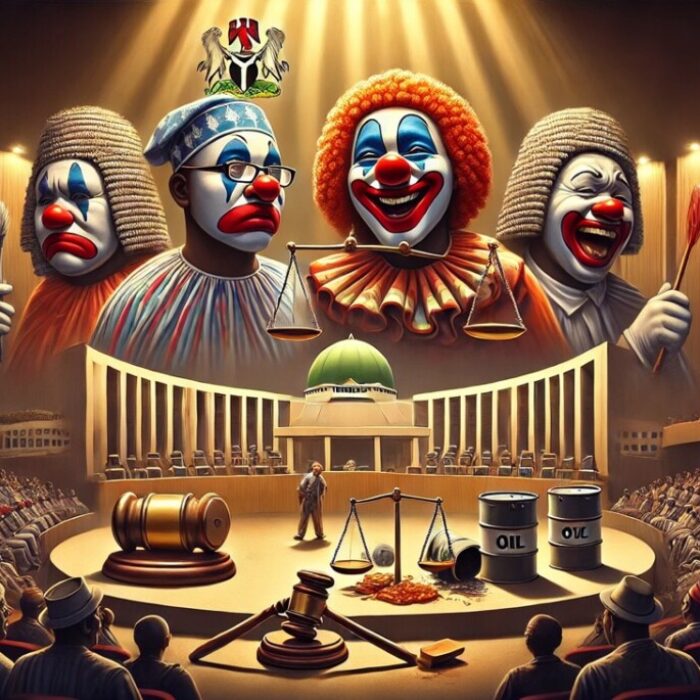By The Editorial Board
Mr. Muhammadu Buhari, the former military leader turned politician, has had a long and tumultuous career in Nigerian politics. However, his political fortunes began to wane soon after he was elected president in 2015 and have continued to decline steadily since then. His political journey will come to a close on May 29, 2023, marking the end of the nation’s worst nightmare.
The reason for his political death is attributed to politicide – he committed political suicide.
The demise of Buhari’s political life and its descent into political jahannam (hell) provides a valuable lesson to future presidents and other political leaders, highlighting the dangers of toxic political ideologies, ethnoreligious bigotry, hate, and division. This political obituary is, therefore, a warning to those who aspire to lead the nation, serving as a cautionary tale of the consequences that await those who fail to uphold the tenets of good governance, equity and inclusiveness.
His political suicide resulted from a mixture of incompetence, mismanagement, disunity, and bigotry. By promoting exclusionist and malicious ethnoreligious ideologies to protect Fulani dominance, he exacerbated national insecurity and instability, weakened the economy, impoverished millions of citizens, and damaged the country’s standing in the global arena. As a result, the nation is in a worse state today than when he assumed office in 2015.
Sources report that the APC headquarters in Abuja is expected to host the funeral service for Buhari’s political death, but it is anticipated that the event will only attract APC supporters, as many Nigerians who endured horrendous hardship during his tenure have declared their intent to neither attend nor livestream the interment. As Martin Luther King once said, these long-suffering Nigerians are rejoicing in their newfound freedom from Buhari’s tyranny, singing: “Free at last, Free at last, Thank God Almighty we are free at last.” Further, the lack of attendance from any world leaders is a testament to the extent of Buhari’s malignancy, repugnancy and unpopularity.
A Political Life Marked By Spectacular Failures
During Buhari’s presidency, the Nigerian economy suffered a significant decline. In February 2023, the inflation rate rose to 21.91% (NBS), well above the promised “single-digit” rate. Moreover, the real GDP growth (year-on-year) in Q4 2022 was a mere 3.52% (NBS), only half of the promised 7%. Additionally, general unemployment reached an all-time high of 37.7% by the end of 2022, with youth unemployment at 54%. Buhari’s administration over-borrowed to fund corruption and consumption, and as per the IMF, Nigeria may spend almost 100% of its revenue on debt servicing by 2026. Although the COVID-19 pandemic and the Russian invasion of Ukraine exacerbated the economy’s downturn later in his tenure, the decline started long before these external factors, primarily due to Buhari’s lack of an effective strategic economic plan and his poor management of the nation’s resources and the economy.
Buhari had ample opportunities to make a positive impact during his presidency. However, his tenure ultimately resulted in disappointment and tragedy for Nigeria. Rather than promoting unity and patriotism, Buhari fostered tribalism, religionism, hate, and division. He prioritized establishing a Fulani-dominated government, disregarding talented Nigerians who were not Fulanis. His actions set the nation back and destroyed any remaining national solidarity after years of misrule by the APC and PDP.
Buhari’s failure to recognize the value of different groups, particularly the Igbos, resulted in him considering them as liabilities instead of talented resources to solve the wicked problems faced by the nation. Despite being the president of all Nigerians, Buhari’s attitude towards the Igbos was reminiscent of the Biafra war, and he appeared to be waging a campaign to eradicate them.
He also denied basic liberties, such as the right to peaceful protest and conscientious objection, to those who opposed his policies, including the peaceful #EndSARS protesters. In addition, he demonstrated disdain towards the millions of Nigerians living in poverty and unemployment, instead of providing them with much-needed assistance. It is not surprising that Buhari is widely known as “Buhari The Terrible” among the Nigerian populace.
Buhari failed to comprehend that a united Nigeria is a stronger Nigeria and that democracy and the rule of law are essential to national stability. By keeping a list of enemies (according to insiders who requested anonymity), he disregarded the fact that patriotism entails constructive criticism of leaders and the country while still maintaining a love for both. Effective leadership in Nigeria’s multiethnic society requires a balance of interests to ensure diversity, equality, and justice. This was lost on him.
When we consider the moral corruption of the APC party that he led, it becomes clear why Buhari is widely regarded as the worst president in Nigerian history. As we move forward, it is essential to learn from the failures of his presidency and work towards rebuilding a more united, just, and equitable Nigeria.
One of his many detrimental legacies is a corrupt and ineffectual APC party that clings to power through undemocratic methods, while the nation is plagued with extreme poverty and insecurity. Perhaps his most damaging legacy is a culture of national distrust, division, and disunity among various tribes, religions, and regions.
Although Buhari’s disastrous policies can be reversed by future leaders with moral quality, inclusivity and competence, the wounds he inflicted on the nation will take time to heal. It will require years of good governance and public welfare to restore generalized trust and renew the lives devastated by his ineptitude and misgovernance.
In summary, Buhari’s presidency inflicted a devastating impact on Nigeria, resulting in a profound wound in the country’s political system, national security, economy, social fabric and tribal and religious relations. It is now imperative to pen the last political obituary for Buhari and focus on the challenging task of reconstructing and uniting the nation. May his harmful politics and repugnant ideologies repose in his appropriately named Daura farm, “Hell.”


